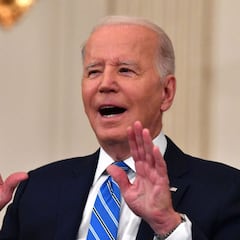Who are the main candidates for the position in the Supreme Court?
President Biden will have his first and perhaps only opportunity to fill a seat at the Supreme Court. Here’s a look at some potential candidates.

Shortly before South Carolina’s presidential primary in February 2020, then-candidate Joe Biden said “As president, I’d be honored, honored to appoint the first African American woman. Because it should look like the country. It’s long past time.” With the decision by Supreme Court Justice Stephen Breyer to step down at the end of the term, the stage is set for President Biden to follow through on that campaign promise.
On Thursday, Biden reaffirmed that commitment “While I've been studying candidates' backgrounds and writings, I've made no decision except one: the person I will nominate will be someone with extraordinary qualifications, character, experience and integrity. And that person will be the first Black woman ever nominated to the United States Supreme Court," Biden said. "Our process is going to be rigorous. I will select a nominee worthy of Justice Breyer's legacy of excellence and decency.”
Also see:
- Supreme Court Justice Breyer retirement | live updates
- What has Biden said about the Supreme Court replacement?
- Supreme Court Justice Retires: who is Justice Stephen Breyer?
- A look back at the career of Supreme Court Justice Stephen Breyer
Democrats plan to move “expeditiously” on Justice Breyer’s replacement
President Biden’s nominee, should she be confirmed, will not change the ideological makeup of the Supreme Court where conservatives outnumber liberals by 6-3. Justice Breyer was nominated to the Supreme Court in 1994 by President Bill Clinton. At 83, he is the oldest justice and Democratic lawmakers have been calling on him to retire since Biden took office so that the opportunity to appoint another liberal justice isn’t missed.
There is concern that Democrats will lose their narrow majority in the 2022 midterm elections, giving control of the upper chamber back to the Republicans. That would put Senator Mitch McConnell back in the driver’s seat of the confirmation process for a new high court justice. He infamously would not even consider President Obama’s nomination of Merrick Garland to the Supreme Court for eight months in 2016, claiming it was too close to the election. But he then turned around and sped through the appointment of Amy Coney Barrett in 2020 just weeks before the presidential election.
Pres. Biden on who he will nominate next to the Supreme Court: ‘That person will be the first Black woman ever nominated to the United States Supreme Court’ pic.twitter.com/1X0tWOA9w4
— NowThis (@nowthisnews) January 27, 2022
Senate Majority Leader Chuck Schumer has said that he plans to move swiftly with the nomination process, using roughly the same time frame as the one Republicans followed to move the appointment of Justice Barrett which was just under a month. Barring any controversies about the potential candidate during the process, even in the highly partisan atmosphere, Biden could perhaps count on a couple votes from centrist GOP senators.
Otherwise, because of a rule change by Republicans in 2017 for Supreme Court confirmations, Democrats only need a simple majority, with the 50 votes they can count on and Vice President Kamala Harris’s tie-breaking vote. Once the White House submits a candidate for consideration Senator Dick Durbin, Chair of the Senate Judiciary Committee, stated his panel will move "the President's nominee expeditiously through the Committee."
How much this desire to get a nominee confirmed quickly plays into the calculus of who is named to replace Justice Breyer will be revealed when President Biden makes his decision. That is expected to come before the end of February, but the White House has already been preparing a list of possible candidates. Although no names have been put forth by the administration, the one thing we know is that it will be the first Black woman nominated to the Supreme Court. Here are a few of the top contenders.
Judge Ketanji Brown Jackson is among the leading candidates who could fulfill President Biden’s pledge to nominate the first Black woman to the Supreme Court, after Justice Stephen Breyer's decision to retire. Here's what we know about her. https://t.co/3yrDgIDcqJ
— NYT Politics (@nytpolitics) January 27, 2022
Judge Ketanji Brown Jackson
Judge Ketanji Brown Jackson, 51, serves as a United States circuit judge of the United States Court of Appeals for the District of Columbia Circuit. She was recently confirmed by the Senate to her current position by a 53-47 vote in June. In that confirmation process she garnered three Republican votes from Senators Lindsey Graham, Lisa Murkowski and Susan Collins.
According to SCOTUSblog she is regularly mentioned as a possible nominee for the high court and was on President Obama's shortlist for the court in 2016. She’s a graduate of the Harvard Law School and clerked for Justice Breyer.
Potential Biden Supreme Court pick Leondra Kruger known as moderate in California https://t.co/gZHi2BubC1 pic.twitter.com/6ZtNR8b6WI
— Reuters (@Reuters) January 27, 2022
California Supreme Court Justice Leondra Kruger
Justice Leondra Kruger, 45, currently serves on the California Supreme Court. If chosen, she would be one of the youngest people to be nominated to the Supreme Court. However, she has never gone through a Senate confirmation process which leaves more room for surprises to arise.
Prior to presiding on California’s highest court, she had been the assistant, and then deputy solicitor general in both Democratic and Republican administrations. This could bode well for her getting bipartisan support in the Senate.
Justice Kruger graduated from Yale Law School and clerked for Justice John Paul Stevens in the early 2000s. In the view of some she would be the more dynamic and intellectually stronger candidate according to SCOTUSblog.
Clyburn told NYT in ‘21 that Dems
— Michael S. Schmidt (@nytmike) January 27, 2022
needed to make sure they were not “being painted with that elitist brush,” adding: “When people talk to diversity they are always looking at race and ethnicity — I look beyond that to diversity of experience.” https://t.co/dUAAfHjVUK
Judge J Michelle Childs
Related stories
Should President Biden want to nominate someone who would help the Supreme Court “look like the country” he may nominate Judge Julianna Michelle Childs. Representative Jim Clyburn of South Carolina has been making the case for her to Biden. He was crucial in helping Biden win the primary in South Carolina and later the Democratic Party’s nomination for president. She would be a non-Ivy League candidate, having graduated from University of South Carolina School of Law.
Judge Childs currently serves on the United States District Court for the District of South Carolina. She was nominated to that position by President Obama in 2010. In December, Biden nominated her for the federal appeals court for the District of Columbia Circuit, often considered a springboard to the Supreme Court.


